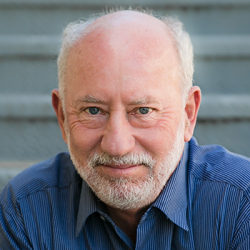What do students gain from having experienced Project Based Learning in school? A typical list you may have seen includes things like:
- Success skills such as critical thinking, problem solving, collaboration, complex communication, making presentations, and creativity
- A sense of agency
- Deeper understanding of disciplinary content and concepts
- Ability to learn and work independently
- Seeing how what they are learning connects to the world beyond school/careers
That’s all true, and at our PBL World event in June of this year we heard some additional, different things from our first-ever PBL student alumni panel.
The students, now in their mid-20s, experienced the “Border-land” project in high school with teacher Ryan Sprott, who is now on the PBLWorks staff. In this project, a special course at International School of the Americas (ISA) in San Antonio, Texas, students explored the driving question, “What is the purpose of a border, and what has shaped your answer to this question?”
The students explored that question while considering the debate over immigration to the U.S. - it was 2016. As Ryan puts it, “We wanted to gain a deeper understanding of the topic compared to the rhetoric surrounding us.” Their project embodied the elements of Gold Standard PBL throughout. Students engaged in authentic inquiry by talking with attorneys, politicians, asylum seekers, Border Patrol Agents, business owners, ecologists, family members, and many more. They read historical documents, created works of art, engaged in small group dialogue circles, silent chalk talks, and other activities focused on equitable sharing. Students also reflected on their own evolving answer to the driving question in a series of portfolio reflections. They took action to address issues they cared about.
What the Students Said at PBL World
On the morning of June 25, in front of the 1000+ attendees of PBL World, three student alumni of ISA who participated in Border-land took the stage: Daneilla Hernandez, Annah Sanchez, and Bianca Garza. They had all attended college and were now engaged in rewarding careers. The panel was moderated by Ryan Sprott. Here’s what they had to say about what their PBL experience had given them.
“It became clear that there was not a binary black and white answer to this (driving) question. Instead, we better saw how every perspective is filtered through lived experiences and positionality, we became less invested in choosing a side or winning an argument. Instead, our focus grew towards pursuing nuanced learning and understanding and compassionate action.”
“Creating art allowed us first to slow down so that we could look deeply as we mindfully processed the complex perspectives we encountered. We used art for inquiry in a variety of ways…”
“Borderland carved out new spaces for uncertainty. … most importantly, the questions that we generated during borderland continue to swirl in our heads and drive our actions nearly a decade later.”
“...the overall learning environment that is engendered by breaking down these hierarchies (between students and teachers) and sharing power because you have to understand the difference between discomfort and danger. And I think a lot of students, when they're uncomfortable, they immediately think that it means that there's danger, and that's something you need to learn as an adult. That is a number one skill.”
“... putting yourself in uncomfortable positions is a choice, and it's something that we all make all of the time. And if we never put ourselves in uncomfortable positions, then we would never grow as people.”
“Something that I found the most significant was the sustained inquiry that we had. We would continue to learn about these topics throughout the year and throughout our experience in whichever course we were in or whichever project, there wasn't an emphasis on an end product necessarily. But what you learned along the way, the reflection aspects of the projects that we did, they have still stuck with me today.”
Ryan concluded the discussion with some thoughts about what PBL does for teachers:
“The more we put shared power at the forefront, the better things are going to be for us too… As you go through your work and you're thinking about your driving question… How does it invite the wisdom of students, include the wealth of your community, and how can you liberate yourself from being the person who believes that you're the sole holder of knowledge and your job is to walk those people to that knowledge? When we create knowledge together, it transforms ourselves. It transforms our community, and it is a beautiful thing.”
Pretty deep stuff, eh? If I were to reduce the students’ comments into another bullet list of what students gain from PBL, it might be:
- The understanding that issues in life have many sides, and deeper understanding is the goal, not winning an argument.
- The realization that uncertainty is OK.
- Finding their voice.
- Discovering that discomfort is not danger, so embrace it.
- Learning that reflection is valuable; the journey is more important, not the end product.
- That students can have as much power in the classroom as the teacher and become co-creators of learning experiences.
So when folks ask, “How does PBL impact students later in life?” we can point to these now-adults. Nearly a decade after their project, they continue to carry forward the lessons of inquiry, reflection, and shared power into their careers and communities.
🎥 Watch the full Student Alumni Panel from PBL World 2025 [link].
📖 Read the Getting Smart interview with Daniela, Annah, Bianca, and Ryan Sprott conducted before PBL World [link].
For more details about the Border-land project and others, check out Ryan Sprott’s book, Teaching Contentious Topics in a Divided Nation: A Memoir and Primer for Pedagogical Transformation [link].

